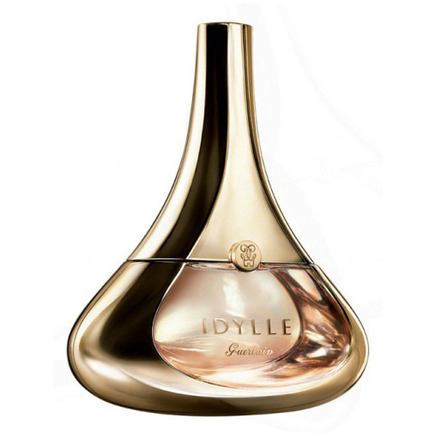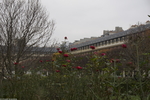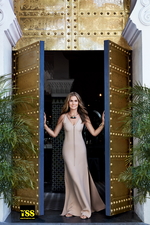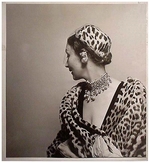Guerlain Idylle (2009) Part 2: The Creation of Longing & Beauty {Perfume Review}

This is the follow-up to Guerlain Idylle Part 1: The Evolution of Guerlain's Signature
If I had
stayed with my first impression of the perfume upon smelling it casually in a
department store, I would have had to write that the new Guerlain Idylle is
incomprehensibly devoid in creativity, originality and personality.
A superficial take on it will make you believe initially that this composition
is yet another variation -- barely -- on the tried-and-tested
musk-rose-patchouli standard ensconced in the young and foolish (in a good way)
neo-chypres that have been put out since Narciso Rodriguez for Her EDT. It was
then closely followed by Sarah Jessica Parker Lovely which managed to fly under
the radar of copycatting and pass as an endearing novelty thanks in part to
SJP's lovely pink tulle dress. Later, it was succeeded by the noteworthy Gucci
by Gucci, Yves Saint Laurent Elle and Dior Midnight Poison. Caresse by
Fragonard is also a take on this accord. It is these days the ever-popular
accord, that is, if you pay attention, and has become one of the significant
olfactory signatures of the times. What will one day bring tears of nostalgia
to the eyes of the future generations because it smelled so much like the end
of the 20th century and the beginning of the 21st, for now can make you grind
your teeth at so much unoriginality when encountered one time too many.
My initial reaction to Idylle was disbelief: I just felt like throwing my arms
up in the air and shaking my head at so much ineptitude. Really, for one of
their major mainstream launches couldn't the house of Guerlain do better than
this? This, to just reheat the Narciso Rodriguez for Her brew courtesy of
Francis Kurkdjian, Christine Nagel and the majority's approval on a gas burner
and serve it as if piping hot in a new vessel?
Incidentally, the flacon by Ora Ito is more beautiful in person than on any of
the pictures I have seen. It is a much more subtle form in reality.
I was apparently able in some vexing way to perceive only the shell of the
perfume rather than its internal nuances. Retrospectively, it feels a little as
if the real story of the perfume was taking place inside a snow globe and I was
only able to feel the outer surface. Even on the street, the sillage continued
to murmur to me all the sweet expected nothings from a rosy young chypre
desperate to follow the trend rather than set it.
Day and night as they say....
This
complex, delicate composition cannot be appreciated well in the noise of a
bustling street or the distraction of a shopping area. You just need to have a tête-à-tête with it the first time you
meet it, ideally. It requires close reading. Then, like a shy person who talks
too loud and in stereotypes in public but is in fact a treasure trove of
sensitivity, the perfume unfolds, offering an unbelievable moment of
beauty. The scent even manages to create a lasting impression in you,
going beyond the point where you are smelling it. You remember it or smell it
anew very quickly and it feels painful because it is just so heart-wrenchingly
and exquisitely beautiful in its transiency.
Kant remarked that the contemplation of [true] beauty creates a hurt, a
physical pain in us because at the same time that we feel this aesthetic
emotion, we know that beauty will not last and it immediately creates in us the
conflicting consciousness of limitation and death. This aesthetic gnawing is a
rare feeling that I have experienced only a few times in my life. Idylle
manages to provoke in me this feeling of torture, of longing, even when I just remember
its aroma, and certainly it was particularly intense in that second encounter.
Why is the feeling not exactly repeatable? Perhaps it has to do with my
consciousness that I can recreate at will this beauty, which in turn creates a
double-sided effect: the perfume becomes less beautiful because it is more
accessible, reproducible and can be reenacted, and prettier and happier because
it is like natural beauty tamed and put in a golden cage. Moving from the plane
of a sentiment of a loss of control over your destiny -- beauty is the ultimate
shock, unpredictable and ephemeral -- you arrive at a plane where beauty is on
a leash and slightly coquettish, imbued with the desire to please.
If the perfume can make you feel suffering at so much beauty, it also makes you
want to jump on a rooftop at dawn to shout out of joy and enthusiasm.
Olfactorily, Idylle is a perfume that unfolds slowly, almost lazily, as if it
were a nymph stretching by a pond in the forest in the springtime. The scent
starts with wet, dewy rose/floral notes followed by powdery, civet-y and sueded
leather notes. The crystalline notes in the beginning are followed both by
changes in olfactory tonalities and textural feels: the clear drops give way a
little to a soft, satiny iris, then to young green shoots. There is especially
a contrast between a pink rose and a green jasmine: a very crisp peony-rose is
followed by a thread of raspy raw indolic jasmine which weaves itself into the
lighter, pink very top notes. I heard afterwards that the green jasmine was a
cultivated facet for the scent. The combination is delightful and unusual.
Underneath it all, there is a graceful sweetness dipped in a refined vanilla
with some hints of tamed animality, the latter evocative more of a pair of
kid's gloves than a sheepfold, although a rougher nuance can occasionally drift
to the surface of your perception. It is a perfume that is somewhat hard to
translate into words as the nuances can be so minuscule and dainty. It is like
a very precious bouquet that would have been left to fade for a night in the
corsage of young woman, or in her boudoir. The buttery, sensual aspect is very
intimate, conjuring up the proximity and sound of a hearbeat under the skin. The
perfume then becomes mellower, rounder and velvetier but with always a
counterpoint of green indolic jasmine and rose of a very precious, young and
crisp-as-can-be variety. Now a nuance of lipstick-y rose appears.
The vanillic, powdery, indolic and green facets mingle in a very novel way. It
makes me think of a precious rose pistachio bouquet. The blend is very
delicate, very refined. Traditional heavier notes such as ambergris and incense
are treated with infinite sensitivity.
The signature Guerlain touch that I see here expressed in the lingering notes
is closest for me to the exquisiteness of the guerlinade base as found in
Héritage, an underappreciated masculine great entirely borrowable by women.
There is no question for me that Idylle resembles a Guerlain with its balmy
rose-irisey base as in Héritage and tobacco-like notes reminiscent of Shalimar.
Aquatic, dewy notes of freesia, peony and muguet are more accented in this
composition than in what is considered a classic Guerlain signature, the Eaux
de Cologne and Aqua Allegorias notwithstanding. I would also say that there is
a preciosity to the scent that makes me think of the 18th century more than the
19th century, which to me feels like a poetic license taken regarding the
tradition of Guerlain established in 1828. This could be the perfume worn by a
young Marie-Antoinette in the Sofia Coppola movie adaptation.
The composition appears also like a historically multi-faceted blend capturing
the insouciance and unconventional modernist character of Chamade, the
virginal, classic, innocent aspect of Chant d'Arômes, the floral effusion of
Jardins de Bagatelle, the long, distant rose echoes of Nahéma. They are like
the dying sound of a laughter in the refracting mirrors of the galerie des
glaces at Versailles, and then one realizes it is all an illusion of the past of
which traces were kept.
A timid nuance of apricot emerges like a memory of a happy summer that is no
longer. It may be a discreet homage to Mitsouko. The drydown is ever so subtle.
The next day reveals an eau-de-Cologne accord lingering in the deep well of the
fragrance and we are reminded of the work done by Daniela Andrier for the Prada
fragrances such as Infusion d'Iris and L'Eau Ambrée.
Despite its mainstream nimbus noticeable in its desire to appeal to young women
who are used to the musk-rose-patchouli accord, this perfume is heartbreakingly
beautiful, full of the tensions of longing, desire, innocence lost and
regained. I don't know how Thierry Wasser, the perfumer, managed to carve out a
private space for himself in the fragrance while offering that shell of
familiar recognition, but it is just a magnificent composition, very rich in
personal feelings. Here the materiality of the notes is completely heartfelt.
Nothing is gratuitous. The perfumer expresses his love for the Guerlain
perfumes, his love for perfumery and for the fragile, beautiful transiency of
life.
Perfume notes: top: Rose Plessis Robinson; heart: muguet, lilas, pivoine,
freesia, jasmin; base: chypre, patchouli, white musk.










Oh that was an absolutely stunning review, M-H! At times it feels as if you wrote it specifically for me :)
Also, thanks for the nod to Heritage, which I too feel is rather unappreciated.
Dusan, I had no idea, but I am glad :)! Thanks for your kind words.
Heritage has a precious quality about it that I find irresistible. It smells incredible on clothing.
Oh I know! I sometimes find it hard to put my sweaters and Ts in the washing machine, they smell so wonderful! :)
Exquisite review, the first really detailed one I have seen of Idylle, I hope to try it very soon. I was hoping it would be better than their last few releases - speaking as one who thinks nothing truly great has come out of Guerlain since Nahema!
Nahema certainly is a sort of benchmark, one of the last womanly Guerlains with Samsara. It's a bit like the passage stylistically from the 50s hoop skirt to the 60s straight lines, a change. Although I do think that Chamade already presented a more modern signature; at least, it always struck me this way.
Thank you for your kind words!